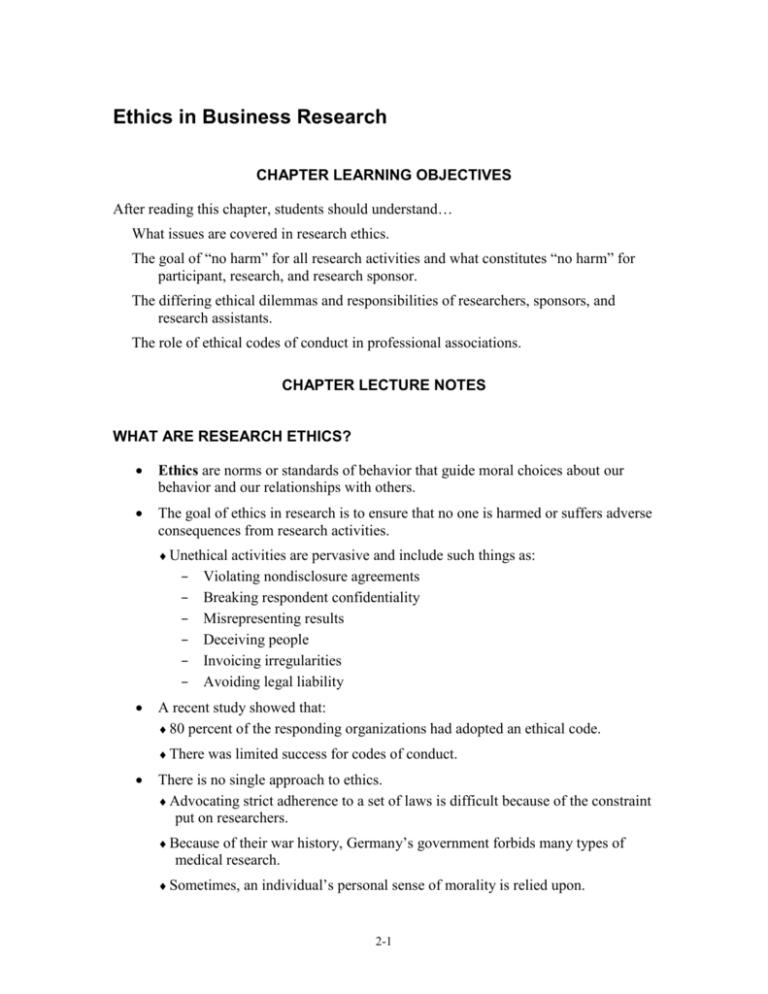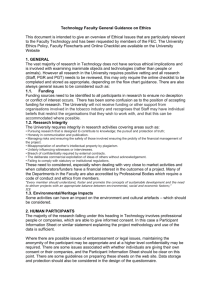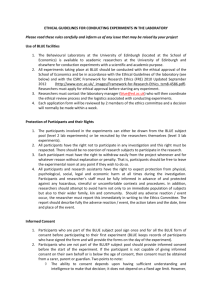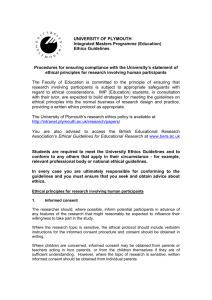What Are Research Ethics?
advertisement

Ethics in Business Research CHAPTER LEARNING OBJECTIVES After reading this chapter, students should understand… What issues are covered in research ethics. The goal of “no harm” for all research activities and what constitutes “no harm” for participant, research, and research sponsor. The differing ethical dilemmas and responsibilities of researchers, sponsors, and research assistants. The role of ethical codes of conduct in professional associations. CHAPTER LECTURE NOTES WHAT ARE RESEARCH ETHICS? Ethics are norms or standards of behavior that guide moral choices about our behavior and our relationships with others. The goal of ethics in research is to ensure that no one is harmed or suffers adverse consequences from research activities. Unethical – – – – – – activities are pervasive and include such things as: Violating nondisclosure agreements Breaking respondent confidentiality Misrepresenting results Deceiving people Invoicing irregularities Avoiding legal liability A recent study showed that: 80 percent of the responding organizations had adopted an ethical code. There was limited success for codes of conduct. There is no single approach to ethics. Advocating strict adherence to a set of laws is difficult because of the constraint put on researchers. their war history, Germany’s government forbids many types of medical research. Because of Sometimes, an individual’s personal sense of morality is relied upon. 2-1 Chapter 02 - Ethics in Business Research – This can be problematic because each value system claims superior moral correctness. Clearly a middle ground is necessary. The foundation for a middle ground is an emerging consensus on ethical standards for researchers. Codes and regulations guide both researchers and sponsors. Review boards and peer groups examine research proposals for ethical dilemmas. Many design-based ethical problems can be eliminated by careful planning and constant vigilance. Responsible research anticipates ethical dilemmas and adjusts the design, procedures, and protocols during the planning process. Ethical research requires personal integrity from the researcher, the project manager, and the research sponsor. Exhibit 2-1 relates each ethical issue under discussion to the research process. ETHICAL TREATMENT OF PARTICIPANTS In general, research must be designed so that a respondent does not suffer physical harm, discomfort, pain, embarrassment, or loss of privacy. To safeguard against these, the researcher should follow three guidelines: Explain study benefits. Explain participant rights and protections. Obtain informed consent. Benefits Whenever direct contact is made with a participant, the researcher should discuss the study’s benefits, without over- or understating the benefits. An interviewer should begin an introduction with: His or her name. The name A of the research organization. brief description of the purpose and benefit of the research. Knowing why one is being asked questions improves cooperation. Inducements to participate, financial or otherwise, should not be disproportionate to the task or presented in a fashion that results in coercion. Sometimes, the purpose and benefits of the study or experiment must be concealed from respondents in order to avoid introducing bias. 2-2 Chapter 02 - Ethics in Business Research The need for concealing objectives leads directly to the problem of deception. Deception Deception occurs when the participants are told only part of the truth, or when the truth is fully compromised. There are two reasons for deception: To prevent biasing the participants To protect the confidentiality of a third party Deception should not be used to improve response rates. When possible, an experiment or interview should be redesigned to reduce reliance on deception. Participants’ rights and well-being must be adequately protected. Where deception in an experiment could produce anxiety, a subject’s medical condition should be checked to ensure that no adverse physical harm follows. The American Psychological Association’s ethics code states that the use of deception is inappropriate unless deceptive techniques are justified by the study’s expected value and equally effective alternatives that do not use deception are not feasible. Participants must have given their informed consent before participating in the research. Informed Consent Securing informed consent from respondents is a matter of fully disclosing the procedures of the proposed study or other research design before requesting permission to proceed It is always wise to get a signed consent form when: Dealing with children Doing research There is If with medical or psychological ramifications a chance the data could harm the participant the researchers offer only limited protection of confidentiality For most business research, oral consent is sufficient. In situations where respondents are intentionally or accidentally deceived, they should be debriefed once the research is complete. 2-3 Chapter 02 - Ethics in Business Research Debriefing Participants Debriefing involves several activities following the collection of data: Explanation of any deception. Description of the hypothesis, goal, or purpose of the study. Post-study sharing of results. Post-study follow-up medical or psychological attention. It explains the reasons for using deception in the context of the study’s goals. Where severe reactions occur, follow-up attention should be provided to ensure that the participants remain unharmed. Even when research does not deceive the participants, it is good practice to offer them follow-up information. This retains the goodwill of the participant and provides an incentive to participate in future projects. Follow-up information can be provided in a number of ways: With a brief report of the findings. With descriptive charts or data tables For experiments, all participants should be debriefed in order to put the experiment into context. Debriefing usually includes a description of the hypothesis being tested and the purpose of the study. Debriefing allows participants to understand why the experiment was created. Researchers also gain insight into what the participants thought about during and after the experiment, which can lead to research design modifications. The majority of participants do not resent temporary deception, and debriefed participants may have more positive feelings about the value of the research than those who didn’t participate in the study. Nevertheless, deception is an ethically thorny issue and should be addressed with sensitivity and concern for research participants. Rights to Privacy Privacy laws in the United States are taken seriously. All individuals have a right to privacy, and researchers must respect that right. Desire for privacy can affect research results. The privacy guarantee is important not only to retain validity of the research but also to protect respondents. 2-4 Chapter 02 - Ethics in Business Research Once the guarantee of confidentiality is given, protecting that confidentiality is essential. Obtain signed nondisclosure documents. Restrict Reveal access to participant identification. participant information only with written consent. Restrict access to data instruments where the participant is identified. Do not disclose data subsets. Researchers should restrict access to information that reveals names, telephone numbers, addresses, or other identifying features. Only researchers who have signed nondisclosure, confidentiality forms should be allowed access to the data. Links between the data or database and the identifying information file should be weakened. Interview response sheets should be accessible only to the editors and data entry personnel. Occasionally, data collection instruments should be destroyed once the data are in a data file. Data files that make it easy to reconstruct the profiles or identification of individual participants should be carefully controlled. For very small groups, data should not be made available because it is often easy to pinpoint a person within the group. This is especially important in human resources research. Privacy is more than confidentially. A right to privacy means one has the right to refuse to be interviewed or to refuse to answer any question in an interview. Potential participants have a right to privacy in their own homes, including not admitting researchers and not answering telephones. They have the right to engage in private behavior in private places, without fear of observation. To address these rights, ethical researchers: Inform participants of their right to refuse to answer any questions or participate in the study. Obtain permission to interview participants. Schedule Limit field and phone interviews. the time required for participation. Restrict observation to public behavior only. 2-5








